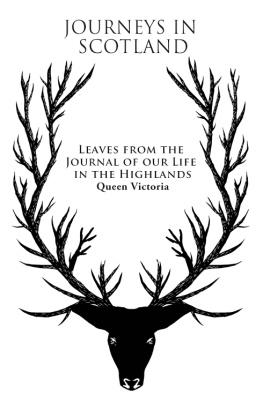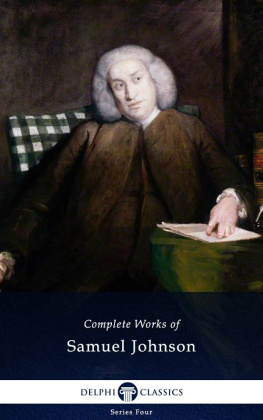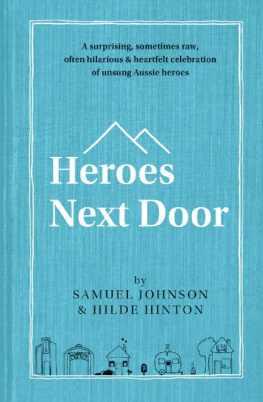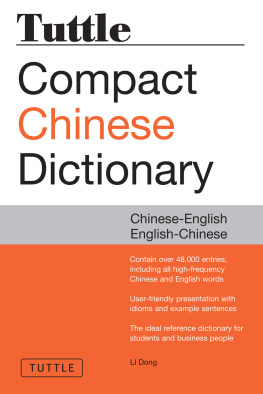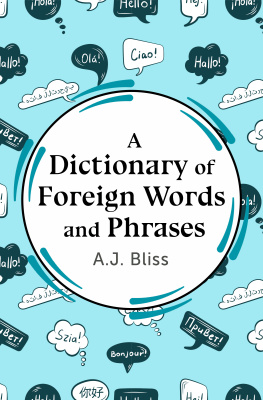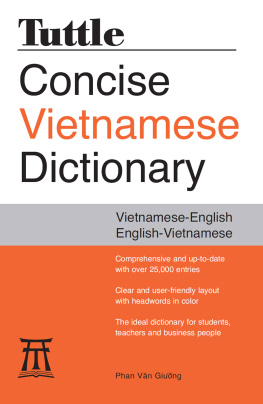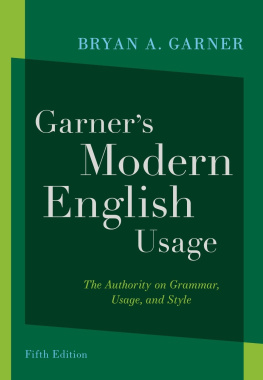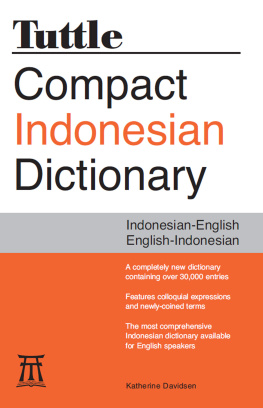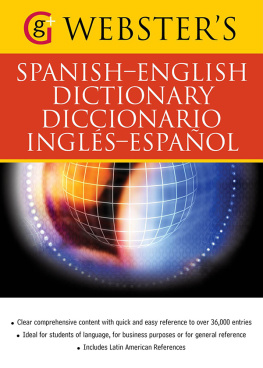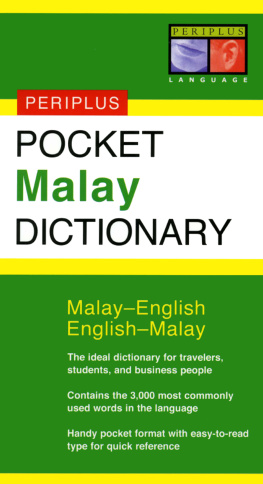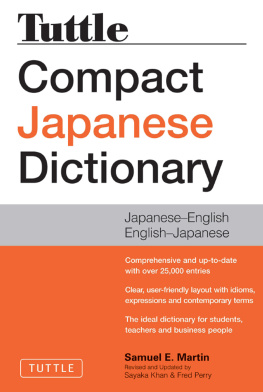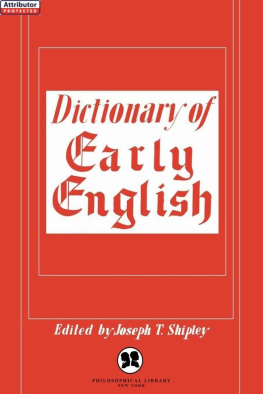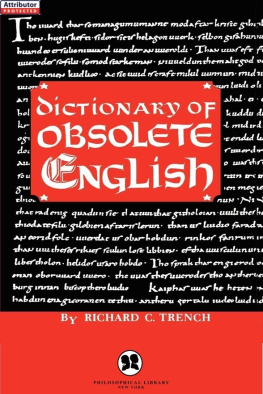JOHNSONS DICTIONARY
An Anthology
Selected, edited and with an Introduction by
DAVID CRYSTAL

ALLEN LANE
THE PENGUIN PRESS
Published by the Penguin Group
Penguin Books Ltd, 80 Strand, London WC2R 0RL, England
Penguin Group (USA) Inc., 375 Hudson Street, New York, New York 10014, USA
Penguin Group (Canada), 10 Alcorn Avenue, Toronto, Ontario, Canada M4V 3B2
(a division of Pearson Penguin Canada Inc.)
Penguin Ireland, 25 St Stephens Green, Dublin 2, Ireland (a division of Penguin Books Ltd)
Penguin Group (Australia), 250 Camberwell Road, Camberwell, Victoria 3124, Australia
(a division of Pearson Australia Group Pty Ltd)
Penguin Books India Pvt Ltd, 11 Community Centre, Panchsheel Park, New Delhi 110 017, India
Penguin Group (NZ), cnr Airborne and Rosedale Roads, Albany, Auckland 1310, New Zealand
(a division of Pearson New Zealand Ltd)
Penguin Books (South Africa) (Pty) Ltd, 24 Sturdee Avenue, Rosebank 2196, South Africa
Penguin Books Ltd, Registered Offices: 80 Strand, London WC2R 0RL, England
www.penguin.com
This selection first published 2005
1
Editorial material and selection copyright David Crystal, 2005
The moral right of the author has been asserted
All rights reserved. Without limiting the rights under copyright
reserved above, no part of this publication may be reproduced, stored in
or introduced into a retrieval system, or transmitted, in any form or by
any means (electronic, mechanical, photocopying, recording or otherwise)
without the prior written permission of both the copyright owner
and the above publisher of this book
Except in the United States of America, this book is sold subject
to the condition that it shall not, by way of trade or otherwise, be lent,
re-sold, hired out, or otherwise circulated without the publishers
prior consent in any form of binding or cover other than that in
which it is published and without a similar condition including this
condition being imposed on the subsequent purchaser
EISBN: 9781101491645
Contents
Introduction
The concept of an anthology is routine with reference to such genres as poetry and the short story, but it is unusual, to say the least, in relation to a dictionary. For a dictionary is a tool, compiled to solve a problem of the moment to check a spelling, a pronunciation, a meaning, a point of usage. It is not there for browsing. Who, apart from lexicographers suffering from withdrawal symptoms, would ever want to read for pleasure a selection of entries from a dictionary? For such an exercise to succeed, the source work would have to be of very special historical significance, and its compiler a person whose literary or linguistic standing was sufficiently pre-eminent to demand respect, and sufficiently idiosyncratic to evoke curiosity. There would probably also need to be a special occasion.
All three criteria are satisfied in the case of Samuel Johnsons Dictionary of the English Language. It was written at a critical time in English linguistic history, at the very beginning of a period which would introduce prescriptive principles into English language study, and when the demand for a standard language was at its strongest. It was written as James Boswell claims in the final sentence of his biography by a man whose talents, acquirements, and virtues, were so extraordinary, that the more his character is considered, the more he will be regarded by the present age, and by posterity, with admiration and reverence, a judgement with which few would quarrel. Who else, after all, has been given the sobriquet of a genre in the way that Dictionary Johnson was? And the first edition of the Dictionary was published in 1755 thus motivating those who believe in the significance of round numbers to treat 2005 as a year of special memorial consequence.
So, how does one anthologize a lexicographer? I believe, in the same way that one would a poet. The editor has to look for works (entries, in the lexicographers case) that are acknowledged to be the writers best, or which illustrate special features of style, or points of biographical interest, such as upbringing, milieu, beliefs or, indeed, eccentricities. There will be a concern to be genuinely representative of the oeuvre as a whole. Some works (entries) might be chosen because they illustrate a stage in the authors career, or a particular stage in literary or, in this case, linguistic history. And some will be there because, quite simply, the editor likes them. Background information about the writers intentions will also be useful: just as the Preface to the Lyrical Ballads was invaluable in informing our thinking about William Wordsworth and Samuel Taylor Coleridge, so Johnsons Plan and Preface, as well as the relevant parts of Boswells biography, provide an indispensable perspective for reading the Dictionary entries (which is why they are included in this book).
Applying these criteria to the present case, several types of entry in the Dictionary immediately clamour for inclusion, and some of them have to be regretfully declined. Within the latter category I would place the kinds of lengthy entry which indeed live up to Johnsons characterization of his task as drudgery (see the entry at lexicographer, and also dull sense 8). Every lexicographer knows what these are the need to handle with precision the grammatical words of the language (such as what, as, of, but), the everyday words (one, two, three, January, December), the remarkable number of words beginning with such prefixes as un- and self-, or those light verbs verbs of vague and indeterminate use, as he puts it in his Preface which play an important part in English idiom, such as make and do. In Johnsons case, the longest entry is for take, whose 134 uses (including phrasal verbs) take up 11 full columns of print; but a special mention should be made of the verbs set (88 uses), put (80), stand (69), go and run (both 68). Such mammoth entries were unprecedented in English dictionaries, and they are remarkable in their attention to semantic nuance, but they can hardly be illustrated in a small anthology, which therefore loses in representativeness what it gains in interest by focusing on shorter entries. However, I have included a few of Johnsons medium-length entries such as clear, foot and manner to convey something of the flavour of his more ambitious treatments, and I have included a sprinkling of the shorter grammatical entries (such as he, that and the).
THE INDIVIDUALIST
But how to select among the thousands of remaining entries?
These entries illustrate Johnsons authorial fingerprints on a genre which in later times is notable for the absence of personality traits. But they are far outnumbered by other signs of individualism. He repeatedly cites his own limitations. Of this word I know not the meaning, he says of dogbolt, and similar sentiments are to be found in several entries, such as etch, minnock, skilt and stammel (though he had tracked down a meaning for this last item by the fourth edition). The derivation of tatterdemalion is described as tatter and I know not what. Of deciding between tricker and trigger, he comments I know not which is right. Of plication all he can say is that it is used somewhere in [Samuel Richardsons]


